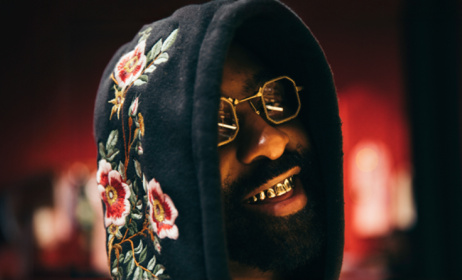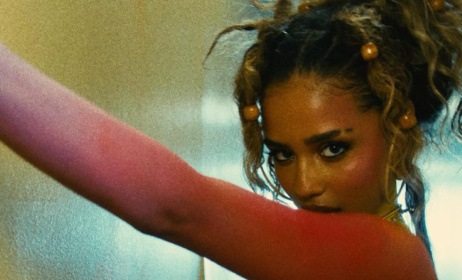Music is the medicine: SA's musicians on black life and silence [part 2]
This is part 2 of 'Music is the medicine: SA's musicians on black life and silence'. Read part 1 here.
 Amos 'Aymos' Shili, Asher Gamedze and Msaki.
Amos 'Aymos' Shili, Asher Gamedze and Msaki.
Msaki
Recently, artist-songwriter Msaki rereleased 'Blood, Guns and Revolutions'. Written and produced by her, together with the esteemed composer and dear friend Neo Muyanga, the song commemorates the Marikana Massacre on 16 August 2012. There have been several iterations over the years, but every time she revisits the song – and every time we are on the cusp of forgetting – the track gains more power. This year’s version carries the percussion of soldiers, chants of revolt and much-needed calls to action. When asked how the #BlackLivesMatter movement folds into her South African experience, she had much to say, in the poetic manner that we’ve come to revere her for:
Capital – a horrible virus able to wipe out whole forests, poison rivers, pollute the air of poor communities and cause dementia of the revolutionary spirit. Youth – some spent those sweet years throwing stones, running from mellow yellows and organising for a revolution that didn’t really happen (well at least in the places that matter the most.) South Africa – the poster child of peace. What do you say to them on these commemorative days, renamed to remove the sting of truth? Sharpeville Massacre to Human Rights Day, Soweto Uprising to Youth Day. Let us at least hope we will never see another massacre in South Africa, our (whose?) land.
Blood tastes a little like metal... Gold. We find ourselves here on the eight anniversary of the Marikana Massacre. During lockdown, police brutality robbed us of the life of Collins Khoza. COVID-19 is like a pressure cooker, amplifying inequality and exposing past trauma. Alongside the people we are losing to the virus, we see a rise in other deaths: black women and children, black queer people. That is another tragic song.
Globally, a song fills the air in defense of black life. 'Black Lives Matter!' We contribute with shallow breathing lungs, policing each other’s grief and outrage. Guilt, disillusionment and confusion all over again. Public complicity in not insisting for justice here at home chokes some of us into silence. The cunning nature of violence does that. It makes the innocent feel guilty while the guilty avoid court successfully. We are tired. We know what it feels like to risk it all for change only to end up being almost free. It’s business as usual. Politicians keep stealing. Eight years on the families of the fallen hold their breaths looking to the horizon with questions unanswerable. The quest for justice for black bodies on this plane sometimes feels like a recipe for heartbreak. But what if we put our disillusionment aside? There might be something here in this moment as the struggle for the true liberation of black people, everywhere gasping for air together. Perhaps we are all getting ready to sing. After all, Mama Miriam Makeba did say, ‘All I have is hope and a song.’ – Msaki
Listen to the 'Blood, Guns and Revolutions' rerelease here.
Aymos
Amos 'Aymos' Shili is one of the most notable voices of amapiano to date, bringing soft wisdom to a genre many wrote off as hedonistic and overindulgent. Partnering with the likes of Kabza De Small and DJ Maphorisa, as well as Mas Musiq and Sha Sha, Aymos is able to juggle the righteous and the ratchet of amapiano’s themes exceptionally well, most notably on 'Zaka' which leant on Savuka’s 'Asimbonanga' to speak to the country’s fixation on money and the insatiable pursuit of it. During lockdown’s darkest period, he took to Instagram to share a track called 'Tomorrow Exists' to inject some hope into his followers’ timelines.
The pandemic made a lot of people feel hopeless, as it was a drastic change from the normal lives we were used to living. 'Tomorrow Exists' is a statement I made in an Instagram post to remind people that it’s only a temporary situation and its passing is inevitable. It is known that there’s always been a stigma of oppression towards the black race, and unfortunately it’s still rampant in our time. However, these are not the olden days where this would go about quietly. Today we have the power of social media, through which we have a global united voice to speak against oppression through the Black Lives Matter movement, which started from the police brutality experienced in America – now called upon for support of our fellow countrymen in Zimbabwe. I keep in mind the thought that people make us greater people with celebrity, but that doesn't make me a different kind of species! With that being said, I always try to be real because I’m human before being an artist, sharing my challenges builds the bonds between me and my fans because they're human too. Keeping my head in the clouds and being grounded, too, opens up a room for endless possibilities. It makes one look forward to what lies ahead rather than the current situation. – Aymos
Asher Gamedze
Free-jazz and protest music meet in Cape Town musician Asher Gamedze’s Dialectic Soul. Receiving great reviews from NPR, Pitchfork and Bandcamp Daily, international tastemakers have found gems in Gamedze’s compositions, particularly for its ability to tie worldwide conduits of the black experience together across time and space. The album’s description speaks for itself: “Free drums representing autonomous African motion, the saxophone reflecting deeply and honestly on the violence of colonialism. The teachings of Coltrane, Biko, Makeba, Malcom and others inspire the music's positive manifestation of resistance.”
I think that both for me and society, the current meanings of #BlackLivesMatter are multiple and contradictory. In one sense the hashtag refers us to many years of serious and radical organising by people and groups associated with Movement For Black Lives in the US, in that sense it also fits into a long tradition of anti-racist organising in that region but also internationally. In another sense, the nature of the Internet, and the way things travel and trend in the contemporary moment, as well as the ambiguity of the political project and the framing of racism that is implied by the hashtag (once it is separated from the original context of organising), has meant the hashtag is taken up by such a huge range of social institutions. From the national English men's cricket team, to various record labels and white liberals, so many groupings whose historical and contemporary character sustain and reproduce racial capitalism have associated themselves with #BLM to the extent now where it has largely become evacuated of any coherent political meaning, not to mention any radical content, due to its severance from actual anti-racist organising. But the adoption or display of 'support for #BLM' by some of these bodies has also provoked discussions about racism in stubborn spaces previously seemingly closed to any engagement with it. At the same time, there are serious issues with the way in which events in the US become 'world events' without reciprocation. This is an issue of imperialism. The way that #BLM has travelled and trended relates to this as well as the fact that the conception of racism implied by the hashtag resonates positively with a liberal sensibility.
I think of myself as a revolutionary or a cultural worker, and my music, what it attempts to say or do, and where that comes from – its political, spiritual and philosophical orientation – is just an extension of that. I am against the idea that artists are an exceptional category of worker. Like other workers, I think that musicians and artists should be involved in various kinds of autonomous political and cultural organising – rather than merely understanding the production and performance of our work as our political statement. If it is not associated with any real political work, like the #BLM hashtag, it can become empty to ‘say things.’ So if we are involved in organising – whether with unions, social movements, street committees, cultural centres, and so on – our music will necessarily emerge from that place and those political processes and we will be able to say different things. To me, it's not a question of artists saying 'black lives matter'. It's about getting involved in real world collective processes that think seriously about what that might mean and attempt to respond to it. If our work emerges from that space, I think we are having a different discussion about what art is and can be within the context of society. – Asher Gamedze
If you’re a musician with your own works and similar stories to share, please email me at contact@shibamelissamazaza.com. I’d love to hear from you.




































Comments
Log in or register to post comments